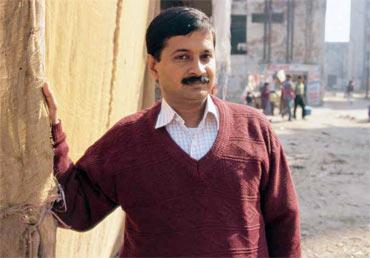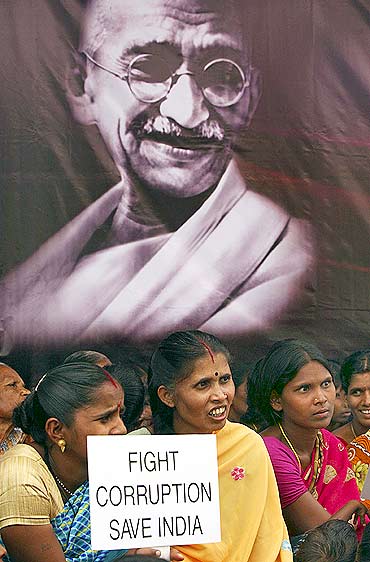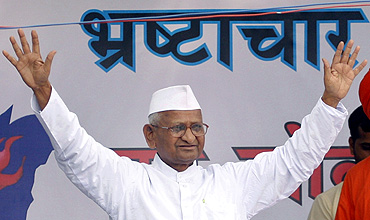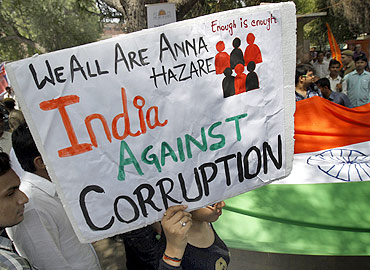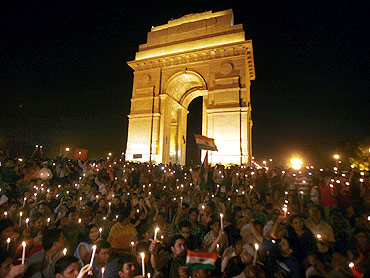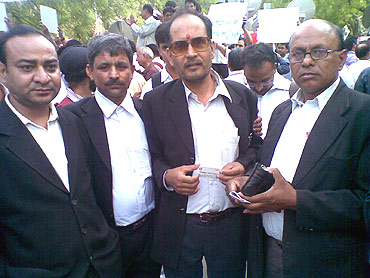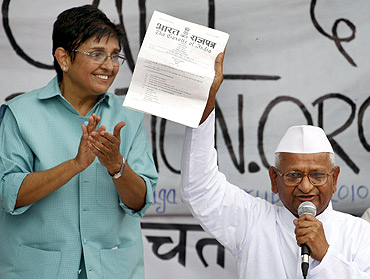 | « Back to article | Print this article |
Government responded to the masses, not Anna: Kejriwal
And taking the crusade forward with Hazare is 2006 Magsaysay Award winner Arvind Kejriwal, who played a key role in convincing the government to allow a joint panel, consisting of government and civil society members, for the drafting of the bill.
In an interview with rediff.com's Sahim Salim, Kejriwal, also known for his efforts in activating the Right to Information Act, explains why the Hazare-led movement was such a huge success. Calling the government as 'insensitive', Kejriwal, who is second-in-command of the movement, outlines what's next in store.
Now that the government has given in to your demands on the Lok Pal bill, can you tell us about the technicalities involved in drafting it?
The joint committee has been formed and the first meeting of the committee will take place on April 16. In that meeting, we will decide the procedures to be followed by the joint committee. We want to draft the bill in the most transparent way.
Click on NEXT to read further...
'We will consult public over draft of bill'
We have a plan of action in mind, which has to be approved by the committee. According to our plan, we will organise regional consultations in different parts of the country through advertisements and non-government organisations. These consultations will involve members of the committee as well. We also plan to put the draft of the bill on a website to get response from the public. A specific team will be put together to monitor this website.
Will the government agree to your demand of video recording the meetings of the joint committee?
We will explain to the committee in the first meet the need for video recording and try to convince them. We need to make the meetings of the committee as transparent as possible.
Have you set any timeline for the government to pass the bill as law?
Yes, Anna Hazare has announced that if the government will not pass the bill as law by August 15, he will urge the people to take to the streets again. This is to ensure that the bill is not stuck in the Parliament forever.
'We are offering solution to corruption, not just standing against it'
The movement received an overwhelming response from the public. Did you expect such a grand response from across the country, especially Delhi?
On January 30, we conducted a rally in Delhi. We expected only about 3,000 to 4,000 people to join us. Instead, around 30,000 people turned up. Similar rallies took place in 62 cities across the country. That gave us an idea about the anger and frustration people have against the large-scale corruption that is prevailing in our country.
We were surprised and overwhelmed by the response ourselves. We knew that the people will respond, but such a response was completely unexpected. What was amazing about the turnout was people from every section of the society came forward.
Why do you think people responded to Hazare, a relatively unknown figure with no political backing or support?
Many aspects played a role. Firstly, people are angry, as they have been witnessing a series of scams in the last few months. Secondly, there has been absolutely no action from the government even after these scams were exposed. There were talks about the scams in newspapers and on television channels and the issue would die down. People are frustrated.
Thirdly, we as a group were offering a solution in the form of a bill to end corruption, instead of just standing up and saying we are against corruption. Fourthly, when Anna went on a fast, he struck an emotional chord with the public. He requested the whole nation to fast and I was surprised to find out how many people observed the fast. I heard that some journalists fasted as well.
'The govt was insensitive towards the movement'
These reports make no sense. In fact, in the next two or three days, we are planning to put up a list of our donors and supporters. The expenditure, as of now, will not be audited, because the audit will take place only next year. We will try and put up the expenditure involved in this movement every ten days or so.
When you launched the movement, did the government, in any way try to lure you and the panel in quitting?
The government was completely insensitive towards the movement. Like us, the government also did not expect such a large-scale response. They initially completely ignored our movement and us. I think that by the third or fourth day, the movement gathered steam, but the government still continued to play their games. They kept us hanging for two days for a matter as small as issuing a gazette notification.
'Public response, not Anna's fast worked in our favour'
Why do you think the government ultimately gave in to your demands?
I think it is because of the overwhelming public support.
Certain sections of the media, especially the print media opinion pages, allege that fast unto death is blackmail. What are your comments on these allegations?
If Anna had been fasting, without any public support, the government would have just put him in the hospital at the end of 10 days and would have forced him to eat. It was not Anna's fast that worked in favour of the movement, but the large-scale public response and support. How can you call that blackmail? The government responded to the masses, not Anna.
'Lok Pal, Judicial Accountability bill compliment each other'
The Lok Pal will have jurisdiction if any judge indulges in bribery in the Supreme Court or the high court. There is a difference between the two bills, though. The Lok Pal will address the criminal misconduct on part of judges, which is a cognizable offence.
The Judicial Accountability bill will address the professional misconduct of judges. That is to say, if a judge passes an order without giving due hearing to both parties, the Judicial Accountability bill will come into play.
Any case coming under the Prevention of the Corruption Act will come under the Lok Pal, because the Lok Pal has investigative machinery, police powers and has the power to initiate prosecution. So you see, both the bills compliment each other.
In your opinion, how strong is the proposed Judicial Accountability bill?
I have not gone through the bill, but I have heard is that it is really weak.
'Decentralisation of political power next on agenda'
We all came together under India Against Corruption. There is no structure or registration; we all work together as individuals. India Against Corruption is a movement and not an NGO. We do not represent the civil society in the sense that we have not fought any elections.
The whole movement started for the Jan Lok Pal bill. The people who drafted the bill are a part of the joint committee because they will need to explain each and every section in the Jan Lok Pal bill to the government representatives. As a movement, Anna Hazare is our leader. We work under his leadership.
As far as our future plans are concerned, the next three items on our agenda after the Jan Lok Pal bill is decentralisation of political power, judicial reforms and electoral reforms.
There have been reports of differences between members of the panel, with Baba Ramdev alleging nepotism in drafting the bill. What are these differences and have they been sorted out?
There are no differences among us. I don't know why Baba Ramdev questioned the inclusion of former law minister Shanti Bhushan and his lawyer son Prashant Bhushan in the committee. Contrary to what certain sections of the media have been reporting, there are no differences between Swami Agnivesh, Kiran Bedi and me. All of us are taking decisions based on common consent. These supposed rifts are being forced on us. We have explained the situation to Baba Ramdev, who subsequently issued a clarification saying that he has no problem.
